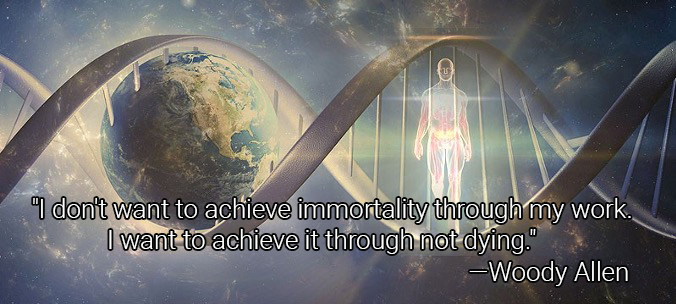
Science Gets a Handle on Living Longer
I doubt that Woody Allen was serious. Who would want to live forever? But science is moving us in the direction of a longer lifespan.
In Greek mythology, three goddesses called the Fates determined at birth the length of time each person would spend on Earth. Life span was said to be directly proportional to the length of a thread spun by the Fates for each person born. As you’ll see below, advances in genetics suggest this mythological tale may be a good metaphor for the mechanism for longevity [1].
Why You Age
Your body is made up of approximately 40 trillion cells. Inside each of these cells is a nucleus and inside each nucleus there are 23 pairs of chromosomes which determine not only your sex, but also all of your physical and many of your personality traits. These microscopic chromosomes are long threads of DNA, and at the very end of each of these threads are specialized tighter stretches of DNA called telomeres, basically caps on the ends of the DNA threads.
These telomers [2] play a critical role in your body because they protect your DNA from unraveling when exposed to toxins, carcinogens, and other genetically damaging agents. Otherwise you would likely die shortly after birth. Some scientists describe a telomere using the analogy of the plastic tip at the end of your shoelaces. If you didn’t have that little tip, the end of your shoelace would fray and not work properly. It would not thread easily through the eyelets in your shoes. This is similar to the ends of your chromosomes. If they don’t have a telomere tip on the end, they too will fray away and cannot do their job properly. And that could be a matter of illness or worse.
In order for you to achieve healthy growth from birth to an adult, your cells must replicate, i.e., reproduce themselves. When they replicate throughout your lifespan, they cannot copy their DNA all the way to the very end of those capping telomeres. Therefore, with each replication of a cell, its telomeres grow slightly shorter. Eventually over many years, when the telomeres become too short, the DNA unravels, and the cell can malfunction and die.
Unraveling the ends of your DNA also causes them to become sticky. Using the shoelace analogy, the shoelace ends become stuck together and this dramatically changes the genetic material which can have disastrous consequences for you. It’s a bit like the shoelaces from both of your shoes becoming stuck together, which can make you fall flat on your face!
Scientists have found that elderly people have much shorter telomere caps than young people, and therefore they believe that telomere length is a marker for longevity and general cellular health. Research results with telomeres support this conclusion. Dr. Carol Greider, a molecular biologist at Johns Hopkins University, who shared the 2009 Nobel Prize in Medicine points out that, “When the telomere gets to be very, very short, there are consequences,” leading to a significant increased risk for age-related diseases [3]. Another way of saying this is that if we could maintain the telomere length on the chromosomal part of the DNA in our cells, we would likely suffer much less bodily degradation with time and live much longer
Signs of Immortality
Molecular biologist Dr. Elizabeth H. Blackburn, who shared the Nobel Prize in 2009 with Professor Greider, has for some years studied small single-cell river creatures called tetrahymena, which have an enormous number of chromosomes. She discovered something quite amazing. Dr. Blackburn determined the structure of the telomeres in tetetrahymena and found that they were not getting shorter with time as is the case for all other living species. In fact, DNA was adding on to the ends of the telomere caps. They did not wear away with each replication as is the case for other living species. The cells could replicate endlessly—they were immortal! This had never been seen before for any other living creature on the planet. The relevant question therefore is, “If we can determine the mechanism for maintaining telomere length, could this be applied in people, and if so, would they live a much longer lifespan?” Some scientists think, yes.
Don’t Worry—Be Happy
Research data also suggest that your level of happiness or the lack of it can have a profound impact on how long you live. Scientists have found that on average about 40 percent of your level of happiness appears to be genetically set, but the other 60 percent is determined by the environment in which you choose to live and function and the activities you pursue [4]. All in all you have significant control over your long-term happiness and fulfillment—60 percent—and therefore, how long you live!
The Bully Effect
Studies at Duke University have shown that experiences in childhood, perhaps even later in life as well can affect the telomere length on your DNA—essentially nurture’s impact on nature [5]. In this study, researchers followed 1,100 British families with twins who were born in the 1990s. They took DNA samples from the children at 5 and 10 years of age.
Over the years, the researchers also conducted in-depth interviews with the twins’ mothers. Those children who experienced during their youth, some form of negative event, such as domestic violence, frequent bullying, or physical maltreatment by an adult, had significantly more telomere loss than other children who did not have these experiences. Since shorter telomere length has been connected to poor survival rates and chronic disease, this does not look good for those children. It suggests that negative events foster the onset of chronic disease and a shorter lifespan, while happiness and fulfillment support a health and longevity.
Anxiety Syndrome
In another study at Brigham and Women’s Hospital of over 5,000 nurses, scientists found that middle-aged and older women with phobic anxiety tend to have shortened telomeres, an indicator of accelerated aging and has been linked to an increased risk of cancer, heart disease, and dementia. The study found that highly phobic women tend to have telomere lengths similar to non-phobic women who are six years older than them [6]. In other words, they are aging more rapidly.
Exercise Helps
Exercise appears to be one way to counter the negative effects of stress, anxiety, and violence. In a research program carried out in Germany, scientists studied large numbers of elderly men and women who had been runners much of their lives and compared their telomere lengths with young adults and also with an elderly group that had been relatively sedentary and had not exercised throughout their lives [7]. The runners had telomere lengths comparable to young adults and overall the elderly runners had telomere lengths that were 75 percent longer than the elderly non-runners. As these researchers noted, “At the molecular level, exercise has an anti-aging effect.”
Living Longer
The implications of these studies are that if you want your children to live a longer, healthier, and more fulfilled life, then you might consider the following:
1. In addition to eating and sleeping well and avoiding genetic toxins such as smoking and environmental pollutants, you might want to be sure they avoid physical abuse, bullying and other forms of domestic violence.
2. In fact, consider the converse—happiness and lasting fulfillment have a positive influence in preventing or slowing down the shortening of those telomere tips and hence the aging process.
3. Exercise slows the loss of telomere length, which is why in the German study, elderly people who had been runners not only looked much younger on the surface but were also younger genetically beneath the surface.
Fulfilled and Immortal
Fulfilled people maintain longer telomeres. Scientists find they live longer, healthier, and happier lives. They may not be immortal, but they have discovered that true long-lasting health and happiness come about from the following process.
They first identify their true ESSENCE, that capability they came into this world with and that sets them apart from others, and which they love to practice and pursue. Then they connect that capability with a NEED in the world that makes it a better place in which to live. It doesn’t matter whether they work in a beer company or a hospital; there is a way to improve on the world within their chosen profession endeavor using their skills. In doing so, they discover their LIFE PURPOSE.
This generates PASSION and results in high levels of emotional and physical ENERGY enabling them to accomplish incredible progress in a short period of time. This energy and passion opens up their CREATIVITY so that they can address difficult challenges, leading the way to INNOVATION in both their personal and professional lives. This inevitably brings REWARDS—financial, psychological, emotional, or spiritual—or some combination. The result is a deep sense of GRATEFULNESS, which is always the basis for long-lasting HAPPINESS and FULFILLMENT [8]. Isn’t that what you’re really after?
You may not live forever, but you can live a longer, healthier, and more fulfilled life, and at the same time make this world a better place in which to live. If science has it way, your children and grandchildren may have the option to improve their health and extend their lifespan by quite some measure!
Enjoy your journey! Make a difference!
Namaste,

Chairman & Owner, Chateau Mcely
www.JimTheAlchymist.Com
Chateau Mcely
“Life Is Beautiful: 12 Universal Rules”
1 – Joseph Stromberg, “Can Your Genes Predict When You Will Die?” Smithsonian Magazine, January 2013.
2 – https://en.wikipedia.org/wiki/Telomere
4 – Jonathan Haidt, “The Happiness Hypothesis: Finding Modern Truth In Ancient Wisdom,” Basic Books, New York, 2006.
5 – DukeHealth, “Bullying May Have Long-Term Health Consequences, January 2016.
6 – http://www.edmontonjournal.com/health/women+anxiety+will+make+older+faster/6922689/story.html
7 – https://well.blogs.nytimes.com/2010/01/27/phys-ed-how-exercising-keeps-your-cells-young/
8 – James A. Cusumano, Balance: The Business-Life Connection, SelectBooks, New York, NY, 2013.

